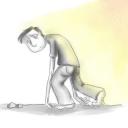Design for Inclusion
Tuesday, August 18th, 2009 Any product, service or experience that heightens our sense of inclusion – or feeling that we belong to a group – generates considerable positive mental energy through meaning, association, security and identity effects. This turns on the idea that people are “social animals” and have a deep need to be part of the pack.
Any product, service or experience that heightens our sense of inclusion – or feeling that we belong to a group – generates considerable positive mental energy through meaning, association, security and identity effects. This turns on the idea that people are “social animals” and have a deep need to be part of the pack.
 On the flip side, products, services or experiences that leave us feeling alienated or even rejected run the risk of generating a river of negative mental energy. The old idea that rejection “hurts” is at work here. Found an interesting item in the UCLA newsroom that indicates just how deep this effect may go.
On the flip side, products, services or experiences that leave us feeling alienated or even rejected run the risk of generating a river of negative mental energy. The old idea that rejection “hurts” is at work here. Found an interesting item in the UCLA newsroom that indicates just how deep this effect may go.
The findings give weight to the common notion that rejection “hurts” by showing that a gene regulating the body’s most potent painkillers — mu-opioids — is involved in socially painful experiences too, said study co-author Naomi Eisenberger, UCLA assistant professor of psychology and director of UCLA’s Social and Affective Neuroscience Laboratory.
Inclusion and rejection are powerful psychological forces, ones that appear to be rooted in genetics. They are a deep well of mental energy for the sensitive cognitive designer.